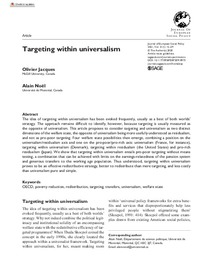Targeting within universalism

Jacques, Olivier ; Noël, Alain
Journal of European Social Policy
2021
31
1
February
15-29
welfare state ; poverty alleviation ; income redistribution
Income distribution
https://doi.org/10.1177%2F0958928720918973
English
Bibliogr.
"The idea of targeting within universalism has been evoked frequently, usually as a best of both worlds' strategy. The approach remains difficult to identify, however, because targeting is usually measured as the opposite of universalism. This article proposes to consider targeting and universalism as two distinct dimensions of the welfare state, the opposite of universalism being more usefully understood as residualism, and not as pro-poor targeting. Four welfare state possibilities then emerge, combining a position on the universalism/residualism axis and one on the pro-poor/pro-rich axis: universalism (France, for instance), targeting within universalism (Denmark), targeting within residualism (the United States) and pro-rich residualism (Japan). We show that targeting within universalism entails pro-poor targeting without means testing, a combination that can be achieved with limits on the earnings-relatedness of the pension system and generous transfers to the working age population. Thus understood, targeting within universalism proves to be an effective redistributive strategy, better to redistribute than mere targeting, and less costly than universalism pure and simple."
Digital
The ETUI is co-funded by the European Union. Views and opinions expressed are however those of the author(s) only and do not necessarily reflect those of the European Union or the ETUI.